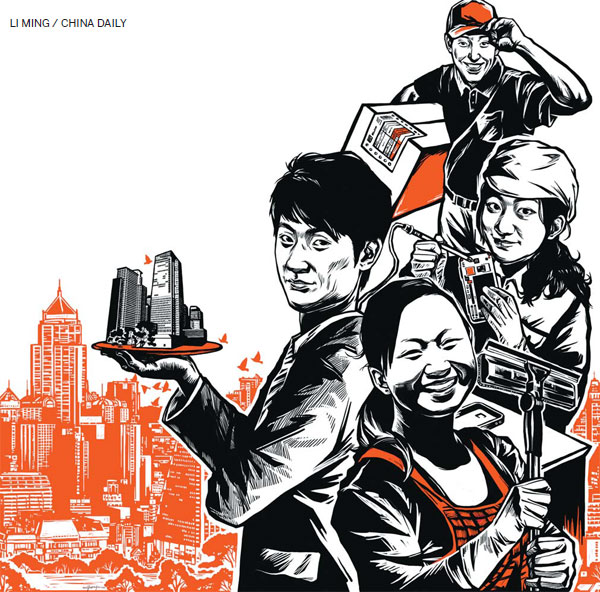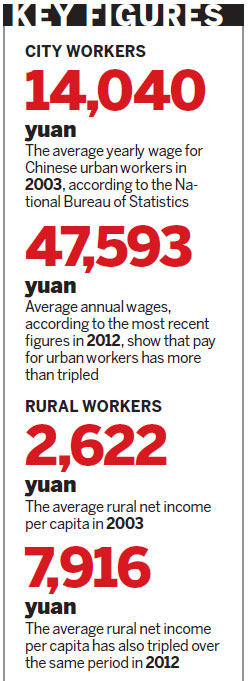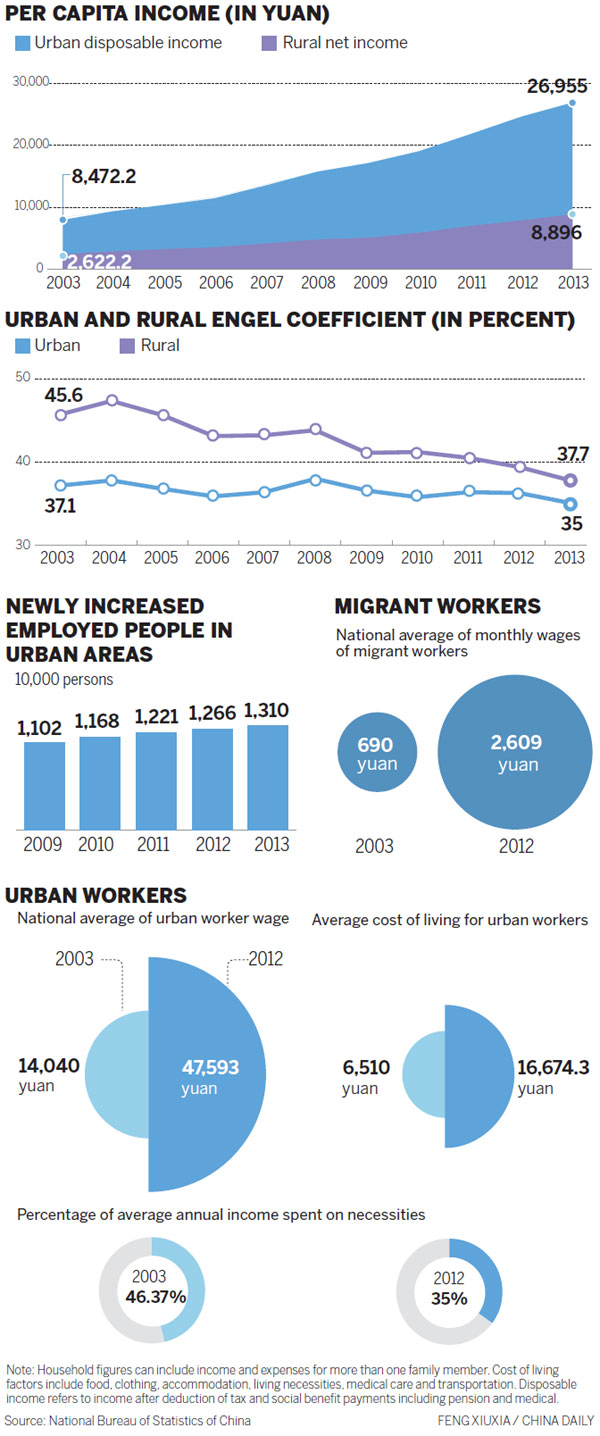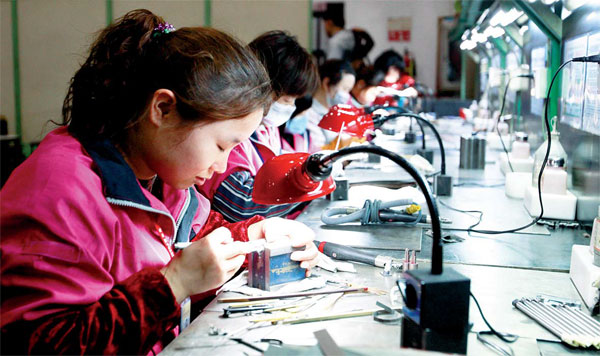Changing face of Chinese worker
Updated: 2014-05-01 07:27
By Joseph Catanzaro and Cai Muyuan (China Daily USA)
|
||||||||
In a May Day special report, we profile the dream and reality for the country's young employees
It's 8 am in Shenzhen, and outside Foxconn, the better part of the mega-factory's 160,000 employees are coming on or off shift. Young men and women stream through security checkpoints, entering the rarely seen world inside the company's China headquarters.
The grounds are neatly manicured. Tree-lined streets full of restaurants and retailers break up the blocks of utilitarian buildings where production lines churn out iPhones, iPods and computers.

In one corner of the compound stands a cluster of apartment blocks, home to some 40,000 employees. There is a hospital and a sports field, a canteen that serves 16,000 people at each sitting. There is a building with a "therapy room" decorated in bright colors, where workers can sit and stare at stickers of cavorting butterflies, or a painting of a stag with bouquets of flowers sprouting from its antlers. Across the hall is a bustling call center where operators man a counseling help line for employees.
The line between factory and city blurs beneath kilometers of suicide prevention nets.
Since 2010, when global media attention fixed on Foxconn following a spate of attempted suicides, the manufacturing giant has rightly or wrongly been held up as a weathervane for working conditions in China.
But whether through corporate confidentiality, or the barriers of culture and language, much about the professional and private lives of Chinese workers remains a mystery even today.
Five years after Time magazine named the Chinese worker runner-up in its annual person of the year award, this special May Day edition of China Daily takes readers inside Foxconn and behind closed doors of businesses across the nation, for a glimpse into the lives of the ordinary people driving the world's second- largest economy.
And the latest figures released by China's National Bureau of Statistics show those lives are changing dramatically.
Nothing gleams in building E5, an open hangarlike space with concrete floors. This is not one of the massive production lines where workers assemble shiny finished products for Apple, HP, Nokia, IBM, Samsung, Amazon, Sony and Dell.

Suggested in the shapes of casts and molds is the secretive anatomy of the world's smartphones and tablets.
Li Guizhen, 32, watches over a row of silent women who delicately pick at components with tiny implements.
Like the vast majority of Foxconn employees, Li is a migrant worker, one of almost 269 million men and women in China who have left their hometown temporarily or permanently to work in the nation's cities and manufacturing centers.
A devout Muslim and father of two, Li is about 3,000 kilometers from the farm in Xinjiang where he grew up. Beyond geography, the distance can be measured in years and money and lifestyle, a journey from poverty to the doorstep of China's burgeoning middle class.
"When I was a little kid, my father was a farmer, and we were very poor," Li said. Now, as a manager in the mold-making production area, he earns more in two months than his father made in an entire year as a farmer.
In another part of the compound, somewhere on the factory line, 21-year-old Jiang Caixia dutifully checks the backs of iPhones for scratches. "I check about 260 per hour," she said. "I check more than 2,000 phones per day."
A farmer's daughter, Jiang got a job with Foxconn two years ago. "I live here inside the factory in a dormitory," she said.
Her typical workday starts at 8 am. She has a 30-minute lunch break, and finishes at about 6 pm. If there's a big order in, she works from 8 am to 8 pm, with the last two hours paid at overtime rates.
"The base wage is 2,500 yuan a month," she said. "With overtime, I can get about 3,700 or 3,800 yuan."
Turn the clock forward a decade or so, and Jiang might be Sun Xiaoji, the woman sitting next to her outside the "Foxconn Cafe".
The daughter of humble farmers, Sun finished high school about 16 years ago and left her hometown in Hubei province to work on the Foxconn production line.
In many ways, 36-year-old Sun represents the changing face of the Chinese worker.
"I never went to college before I came here. But they had a program here at Foxconn. I got a technology degree (vocational qualification) by going to class after work."
Sun is now an assistant production manager and a mother of two. She makes about 16,000 yuan ($2,550) per month, enough to employ an ayi, or nanny, to help take care of her two children, aged 6 years and 18 months. Shenzhen is now her home. She owns a house in town with her husband, who also works for Foxconn.
The conditions and salary, Sun conceded, weren't always this good. But she said the catalyst that has defined modern China, rapid change, is now reshaping the lives of workers.
"When I first came here, we didn't know how to protect our rights," she said. "If there were extra hours, we were happy to work extra hours. We didn't know there were laws that say you are not allowed to work over a certain amount of hours. I used to think that working meant I just have to work hard. Now I think I have to work hard, but I also have to feel happy in my work."
Jiang plays with an inexpensive Huawei handset. She said she couldn't yet afford to buy one of the more than 10,000 iPhones she helps make every week. Her parents were too poor to send her to a university, but she said she is happy with the work and pay. So is Sun.
"It's not like what outsiders say, that we are a sweatshop factory," Sun said.
In February, the day after the traditional Chinese New Year holiday ended, migrant workers lined up outside Foxconn's gates looking for work - 20,000 of them, said the company's spokesman for the Chinese mainland, Liu Kun.
The profile of the average employee in the Shenzhen factory is a 23-year-old male from a poor rural area who has a low level of formal education and little or no practical work experience.
Liu complained that employee loyalty is a thing of the past.
"Sometimes they are like working-holiday tourists," Liu said.
Wu Shengyang and his friends rank among that generation of more mobile workers.
They slowly walk along a wall in the maze of streets that is downtown Shenzhen, perusing a collage of printed and hand-scrawled job notices plastered on signs. Packs of other 20-something migrant workers follow in their wake.
"We just got here from Guangzhou today," he said.
Wu hopes to find work nearby in what looks like a cluster of dilapidated warehouses, each a teeming ecosystem of small business.
"We are always traveling around the country looking for the best short-term job. It's better because you get paid for what you work."
In one of those buildings, Zhao Shuang, 30, hunches over a sewing machine and churns out women's business tops.
Zhao came to Shenzhen to work about 10 years ago. Her husband is a construction worker. He and their 5-year-old daughter live in Hubei. His parents help take care of their little one.
Zhao starts at 8 am, and usually pulls a 10-hour shift, six days a week. She said she makes 4,000 to 5,000 yuan a month, on par with the average wage for a university graduate in Beijing, which a survey by human resources provider Zhaopin last year found to be 4,746 yuan. But unlike many workers employed by big companies, she receives no healthcare or housing.
Her boss, Lu Keqin, looks up from his machine to chime in.
"If they make more they earn more. When business is good and there's lots of work, they can make 10,000 yuan a month. They choose their hours, it's very flexible."
Zhao's family story is a snapshot of the evolution of the Chinese worker. Her parents were poor farmers, she is a manufacturing worker, and she said her daughter would go to a university.
"I only see my child once or twice a year. It's really hard, I really miss her, but it's easier to make money here, and I need to make money for her. I just want the best in life for my daughter."
A willingness to make personal sacrifices for the family is a characteristic of Chinese workers that Foxconn spokesman Liu believes is on the wane.
"For the new generation, it's been the boom time of the Chinese economy," Liu said. "The country has seen a giant change from agricultural society to the global village. When he or she goes out to get a job, sometimes it's only to earn money for themselves, not their family, so their sense of responsibility is sometimes lower."
When that wave of generational change hit Foxconn five or six years ago, Liu said the company wasn't prepared.
He maintains Foxconn was unfairly targeted over the string of attempted suicides among their employees in 2010, but he pointed out the company has since introduced a number of initiatives like the counseling help line, and raised basic wages "by over 160 percent."
In a report released in December, international workers rights group Fair Labor Association found that 98.9 percent of recommendations it made to Foxconn for improving working conditions had been implemented.
But not everyone on the factory floor is happy.
Lu Feng sits on his bed in the tiny apartment he rents in Shenzhen for 450 yuan a week. There's a cardboard box for a side table, a PC and not much else.
"I'm sick of working in a factory," he said.
Lu, 21, began working for Foxconn when he was 17. A migrant worker from Henan province, he punches out 3,000 to 4,000 motherboards for Apple computers during each eight to 10-hour shift, six days a week.
"The work is very boring," he says. "You can't talk to each other, you can't listen to music. I think it's very depressing. My friends (at Foxconn) think it's very depressing."
With wages rising nationally, he believes he can make more than the roughly 3,000 yuan he takes home from Foxconn per month, and he has handed in his resignation.
On a factory floor near the outskirts of Beijing, Xu Libo pops his head out of a bus engine bay. Up and down the manufacturing line, other Foton automotive workers weld and grind and bolt the people movers together.
Xu, a 32-year-old migrant worker from Shiyan in Hebei province, said his wages have almost doubled to 5,000 yuan per month in the past five years. But there's a tradeoff. He now works an average of 11 hours per day, six days a week, compared with eight hours a day roughly two years ago.
A married father of one, Xu reckons more money for more work is a decent deal.
What they want
Li the Foxconn supervisor now earns enough to have his wife and two children live with him in Shenzhen, a rarity for a migrant worker. His wish in life is to have financial security, so his children can follow their dreams.
Sun the Foxconn middle manager wants to continue climbing the corporate ladder.
Sitting at her sewing machine, Zhao daydreams about seeing her daughter more than twice a year.
Xu from the bus factory looks forward to the moment at the end of every shift when he phones home. His 3-year-old daughter sings him songs and reads him Chinese poetry. One day soon, he hopes to be with her in person, when she does.
Lu wants to take his entire family on a holiday. They've never had one.
Jiang is proud that she makes things that are used every day by people all over China and the world. She also believes hard work in her country can produce more than just iPhones and buses and clothing.
"I believe you make your own destiny."
Xie Wenjia contributed to this story.
|
Workers at manufacturing giant Foxconn on the factory floor in Shenzhen, Guangdong province. Zou Zhongpin / China Daily |

(China Daily USA 05/01/2014 page7)
Most Viewed
Editor's Picks

|

|

|

|

|

|
Today's Top News
Chinese, Australian PMs discuss MH370 flight
China, Russia to hold joint military exercise in May
US sanctions on Chinese businesses opposed
Bronx ice-skating rink considers EB-5 for financing
3 dead, 79 injured in Xinjiang blast
Li's trip to cement China-Africa ties
NY real estate wooing China buyers
US not edged out of Latin America: State
US Weekly

|

|

















